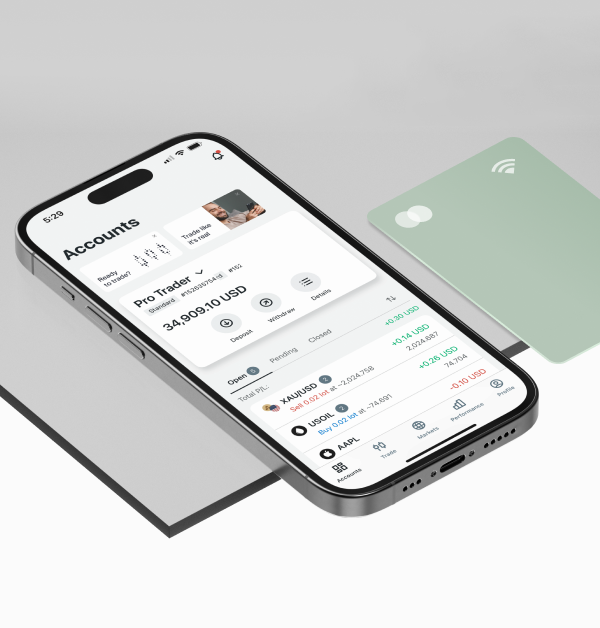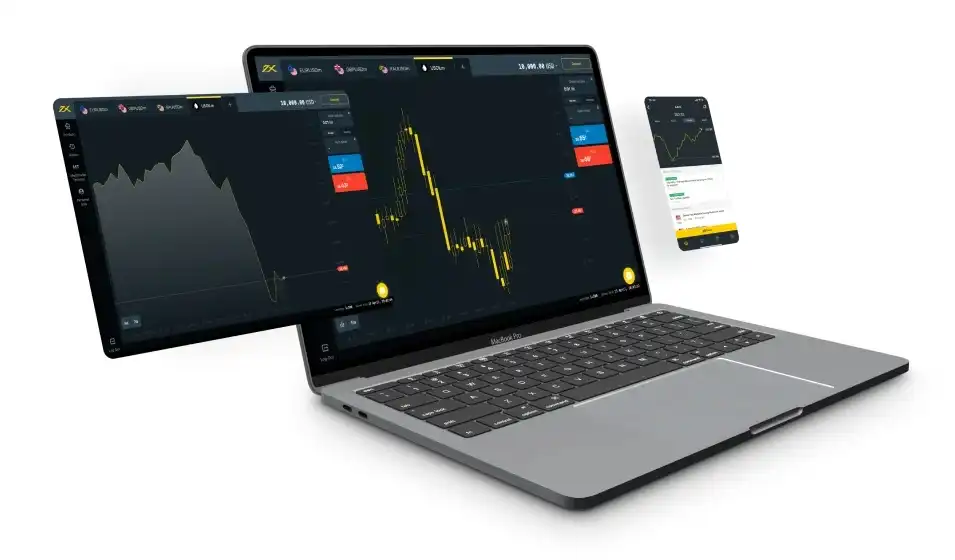Types of Trading Accounts
Trading accounts vary in terms of spreads, commissions, execution types, and trading conditions. Below is an overview of the most common account types.
Standard Accounts
A standard trading account is ideal for beginners or traders who want a simple setup without additional fees. These accounts typically have no commissions on trades, making them a cost-effective choice.
Key features of Standard accounts:
- No commission – Costs are included in the spread.
- Higher spreads compared to professional accounts.
- Low minimum deposit – Suitable for beginners.
- Access to multiple trading instruments such as forex, commodities, and indices.
- Flexible leverage options depending on the broker.
Who should use a Standard account?
- Beginners who want a simple cost structure.
- Traders who don’t mind slightly wider spreads in exchange for zero commission trading.
- Investors who prefer low initial deposits.
Raw Spread Accounts
This type of account is designed for traders who need the lowest possible spreads and are willing to pay a commission per trade.
Key features of Raw Spread accounts:
- Spreads from 0.0 pips on major forex pairs.
- Commission-based structure – Instead of a markup on spreads, traders pay a fixed fee per lot.
- Faster execution compared to standard accounts.
- Best suited for scalpers and day traders.
Who should use a Raw Spread account?
- Scalpers who rely on fast trade execution.
- Traders who prefer lower spreads over zero commissions.
- High-frequency traders using automated systems.
Zero Spread Accounts
Zero spread accounts offer fixed, ultra-low spreads, usually close to 0.0 pips on major currency pairs. However, these accounts often have higher commissions per trade.
Key features of Zero Spread accounts:
- Zero or near-zero spreads on major pairs.
- Fixed commission per lot – Costs are transparent.
- Ideal for algorithmic and high-volume trading.
- Fast trade execution with minimal slippage.
Who should use a Zero Spread account?
- Day traders who need predictable trading costs.
- Traders using Expert Advisors (EAs) for automated strategies.
- Those who prefer fixed spreads with no surprises.
Pro Accounts
A pro trading account is designed for experienced traders who want competitive spreads without commissions.
Key features of Pro accounts:
- Lower spreads compared to standard accounts.
- No commission on trades.
- More flexible trading conditions and execution speeds.
- Suitable for swing traders and long-term investors.
Who should use a Pro account?
- Swing traders and position traders.
- Investors who prefer low spreads without commission fees.
- Traders who hold trades for extended periods.
Demo Trading Accounts

A demo trading account is perfect for learning and testing strategies without financial risk. These accounts provide real market conditions but use virtual funds instead of real money.
Key features of Demo accounts:
- Unlimited virtual funds for risk-free practice.
- Access to real market conditions with live price feeds.
- Ideal for testing new strategies before using real money.
- Helps beginners understand the trading platform.
Who should use a Demo account?
- New traders who need a risk-free learning environment.
- Experienced traders testing new strategies.
- Anyone evaluating a broker’s trading conditions and execution speeds.
Comparison of Trading Account Types
Choosing the right trading account type is crucial for tailoring your trading strategy. Different account types offer varying spreads, commissions, and features suited to different levels of experience and trading styles. Below is a comparison of the key features across the most common account types, helping you determine which account is best for trading based on your needs.
| Feature | Standard Account | Raw Spread Account | Zero Spread Account | Pro Account | Demo Account |
|---|---|---|---|---|---|
| Spreads | Higher than pro accounts | From 0.0 pips | Fixed, ultra-low | Lower than standard | Simulated spreads |
| Commission | No commission | Yes (fixed per lot) | Yes | No commission | No commission |
| Minimum Deposit | Low | Varies by broker | Varies by broker | Varies by broker | No deposit required |
| Leverage | Flexible | High | High | High | No real risk |
| Best for | Beginners, casual traders | Scalpers, high-frequency trading | Day traders, automated trading | Swing traders, long-term strategies | Beginners, strategy testing |
Choosing the Right Trading Account Type
Selecting the best trading account is essential for aligning with your strategy, experience level, and financial goals. Brokers offer different account types, each designed for specific trading styles. Here’s how to decide which trading account is best based on your needs.
How to Choose the Best Trading Account
There are several factors to consider when deciding on the best account for trading:
Experience Level:
- Beginners should start with a standard or demo account to familiarize themselves with the market.
- Experienced traders may prefer raw spread, zero spread, or pro accounts with better trading conditions.
Trading Style:
- Scalping: Requires tight spreads and low latency execution, so a raw spread or zero spread account works best.
- Swing Trading: A pro account with no commission and stable spreads might be a better choice.
Financial Commitment:
- Some accounts require higher deposits for better trading conditions, while others offer lower minimum deposit options.
Trade Volume & Frequency:
- High-volume traders benefit from lower spreads despite paying a commission.
- Occasional traders may prefer accounts with no commission but slightly higher spreads.
Platform Compatibility:
- Ensure the account supports your preferred trading platform, whether it’s MetaTrader 4 (MT4), MetaTrader 5 (MT5), or a proprietary platform.
Leverage Options:
- Some accounts provide higher leverage, which can amplify both gains and losses.
Market Access:
Check whether the account allows trading in forex, stocks, commodities, indices, or cryptocurrencies, depending on your preference.
Conclusion
Most brokers offer a diverse range of account types to suit traders across various experience levels and strategies. From Standard Accounts, ideal for beginners with lower minimum deposits and no commissions, to Professional Accounts like Raw Spread and Zero with lower spreads and advanced features, top brokers provide tailored solutions to enhance your trading experience.
Demo Accounts are also available, offering a risk-free platform for practice regardless of experience level. Choosing the right account type is crucial, aligning with your strategy and risk tolerance. Whether you’re a novice or seasoned trader, the best brokers offer the necessary conditions, including educational resources and demo accounts, to help you develop your skills and build confidence.
FAQs
Which trading account is best?
The best trading account depends on your strategy. Beginners may prefer standard or demo accounts, while scalpers and day traders benefit from raw spread or zero spread accounts.

